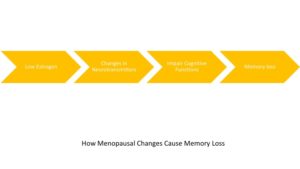As it is, being a woman is tough even if you don’t want to admit it, added to the woes is Menopause- an extremely testing time of a woman’s life. And, no we are not just talking about the typical mood swings, hot flashes, weight gain or sleep issues. Something even more serious happens to your brain.
It is a scary fact that menopause actually puts a pause on your brain too and affects its cognitive function leading to health conditions of Dementia and Alzheimer’s. But what’s happening and why? In simple words, the answer is hormone changes. The constant fluctuations of the estrogen and progesterone hormones can send out a domino-like effect across the brain and body.
When these hormones begin to decline as you get near to your menopause, every system that has these hormone receptors begin to change and so does your brain. While most of us know about changes in the uterus and ovaries during menopause, only a few know what happens to the brain when hormone receptors go down.
How Menopause Affect your Brain?
During your menopause, your ovaries begin to diminish and try to keep up estrogen production. The age at which this happens differs with each case. In some cases, it can start as early as late-30’s while in others it may hit in the ’50s. Some days they will just not be able to produce the hormones and some days they might produce too much. This causes a fluctuation and a chemical dance in the brain.
At times the change is small when you don’t notice any symptoms. However, during dramatic changes, you experience a range of unexpected behaviors. You uncontrollably weep while watching a commercial, you find one minute you love your daughter-in-law and the next minute you have an urge to push her face into a creampie.
Here are top ways your brain gets affected during menopause:
1. Brain Fog
Brain fog constitutes of mental fatigue including memory issues, fuzzy thinking, focus or attention issues, etc. Often brain fog is written off as a symptom of getting older, however, menopause can cause mental slumps and weaker memory. Studies have shown that women in their perimenopausal stage at ages 45 to 55 tend to experience memory issues as estrogen levels dip.
2. Hot Flashes can be a sign of Memory Dips
These estrogen hormones are integral to the activity of the brain and influences language skills, mood, attention, memory, and a number of other important functions. When your body goes through a hot flash, your brain also experiences a chaos since there is a sudden drop in estrogen levels. In fact, a study has found a direct relation between hot flashes and memory performances.
3. Structure of your Brain Changes
As you age changes to the white matter in your brain increases and results in hampered thinking and memory loss. Low estrogen levels can actually propel these changes and lead to amyloid plaque deposits. These deposits are closely related to dementia and Alzheimer ’s.
Ways to prevent memory loss during Menopause
The first thing is to realize that you are not losing your mind, you may have crazy thoughts but you are OK! Here are a few things you can try to make a difference:
1. Support your Adrenals
Now that your ovaries stop producing hormones, adrenal glands come to your rescue and take over much of the hormone production. Your fight or flight response to stress is controlled by adrenal glands through the effective production of adrenaline and cortisol So, it is important to take every step to strengthen adrenal support, without taxing it too much. How can you do it? Cut the stress, sleep well, try Yoga Nidra and meditation and eliminate processed carbs and excessive sugar in your diet.
To know more about the role of adrenal during and after menopause read our article on menopause
2. Replenish your Estrogen
Apart from HRT or hormone replacement therapy that often result in side-effects, you can also replenish estrogen in natural ways to help you keep the levels of estrogen in your brain intact. Food sources of vegetables like soybeans, flaxseed, green beans, garlic, yams, sweet potatoes and fruits like dried dates, dried apricots, raspberries, strawberries, peaches contain high levels of phytoestrogens that mimic estrogen hormones. Also, you try out alternative treatments to balance your estrogen levels using Ayurveda or Naturopathy.
3. Adopt Healthy Lifestyle Changes and Switch to Good Fat
Intake of high-fiber, whole grains and healthy fats like coconut oil, ghee, nuts, and seeds will be good for your brain and body. Equally important is getting enough exercise for women during menopause. Exercises like cardio, strength training, jogging, and aerobics help a great deal to cope up with memory issues. Some women also find deep breathing exercises like Pranayama very helpful for stress relief and increased cognitive function.
4. Ayurvedic Supplements and Natural Herbs
Natural herbs like Shatavari (a species of asparagus), Ashwagandha (Indian Ginseng) and Brahmi will help you deal with most of the symptoms with increased energy and stamina to take menopause head on. Consult an Ayurvedic specialist to understand what works best for you.
The midlife transition of menopause marked by dramatic ups and downs of hormones is a serious issue for all women should not be ignored. Preven memory loss during menopause the natural way by taking corrective actions at the right time.
Minimize The Menopausal Symptoms By Maximizing The Health of Adrenal Glands

